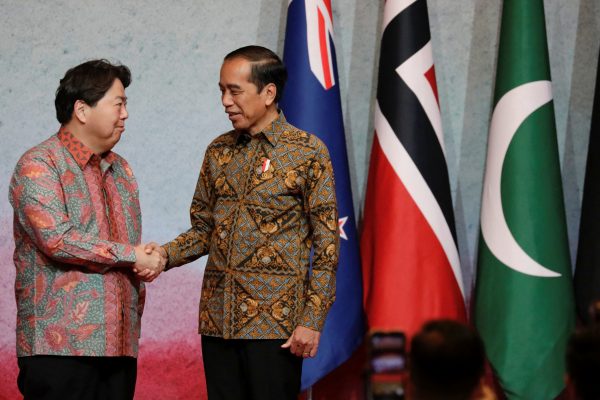Great power rivalry between the United States and China is forcing choices, about which the region is distinctly uncomfortable. Regional power relativities including that between ASEAN and Japan have changed dramatically over the years. Social and technological change as well as political disruption have injected new dynamics into the relationship. The COVID-19 pandemic also exposed the vulnerability of economic growth in a world of hyper-connectivity and mobility.
As Mie Oba points out in this week’s lead article from the latest edition of East Asia Forum Quarterly: ‘[The ASEAN-Japan] relationship … has moved towards greater equality, with Japan’s projection as a major power shrinking after the bursting of its bubble economy and the rise of China in East Asia’.
‘As Japan’s status has diminished’, Oba explains, ‘ASEAN’s economic and political status has grown, elevating Southeast Asian interests globally. ASEAN combined GDP reached about US$3.6 trillion in 2022 — 85 per cent of that of Japan — and the region’s on a strong growth trajectory’.
‘Both ASEAN and Japan now face new external challenges. After the end of the Cold War, East Asia enjoyed a stable regional environment under the liberal international order sustained by US hegemony. This stability is now threatened by a changing power balance and escalating US–China strategic competition. Navigating these power dynamics is complex, and neither Japan nor ASEAN countries can simply choose one side or the other’.
The assets of the ASEAN-Japan relationship — importantly the trust — that have been accumulated over the past half century of large-scale economic and political cooperation provide a solid foundation on which to shape a relationship fit for the next fifty years. Now, with Japan’s demographic and ASEAN’s developmental challenges, it’s a critical partnership that shares new and mutually beneficial complementarities. This is a time for the relationship to shift from one of ‘patron-client’ or ‘donor-recipient’ to one of ‘equal’ partnership and one that is able to ‘co-create’ a regional economy and society that is prosperous, safe, free and fair.
The new issue of East Asia Forum Quarterly addresses these challenges for the ASEAN–Japan relationship and offers ideas, visions and initiatives that might guide its future. How can Japan and ASEAN navigate great power rivalry in the region and ameliorate its negative economic impacts from trade decoupling, technological fragmentation and the interruption of critical supply chains? How can the partnership be brought to bear on the sustainability problems (climate change and waste management), fashion new soft diplomacy (food, pop culture and tourism), assist with digital and green transformation and drive investment in intra-ASEAN infrastructure?
In the Asian Review section, we focus on the ambitions of the Indonesian and Indian G20 presidencies in comparative perspective, whether Chinese-language media is truly a security threat in Australia and the drift away from the separation of economics and politics in Japanese diplomacy.
John Ciorciari argues elsewhere in EAFQ that ‘Japan is a crucial asset to ASEAN in global forums such as the G7 and G20, where it can give voice to Southeast Asian concerns and mobilise resources to address regional priorities. It offers ASEAN members a bridge to the G7, where Southeast Asia is otherwise unrepresented’.
But ASEAN is also a crucial asset to Japan in the management of its relations with the big powers in the region.
Geopolitical developments in the past decade present the heavily economically integrated and internationally exposed states of East Asia with stark choices. They are choices that put significant pressures on the region because of the variegated structure of its political and security ties with the United States. They are pressures that have the potential to drive large wedges among ASEAN members as well as between ASEAN and its dialogue partners in the East Asia Summit process and inflict unrecoverable damage upon the East Asia integration enterprise.
To this point at least ASEAN, in addition to its multilateral system commitments, has played a central role as a political fulcrum around which big power jostling in the region has been stabilised and its cooperation arrangements have served as an effective mechanism for engaging and managing big power interests in the region.
Indeed, it was Indonesia that, during the Osaka G20 Summit, put forward its non-paper on WTO reform — an agenda that is essential to defend the multilateral trading system upon which East Asian prosperity depends — not its host, Japan. And it was the deft diplomacy of Indonesia that saved the G20 dialogue from almost certain collapse during its presidency in 2022.
Japan, like other middle powers in the region, Australia included, relies more and more on ASEAN, through its agency, convening power and fit-for-purpose architecture, to play an unfamiliar leadership role to secure regional interests in the defence of the global economic and political order.
The EAF Editorial Board is located in the Crawford School of Public Policy, College of Asia and the Pacific, The Australian National University.

